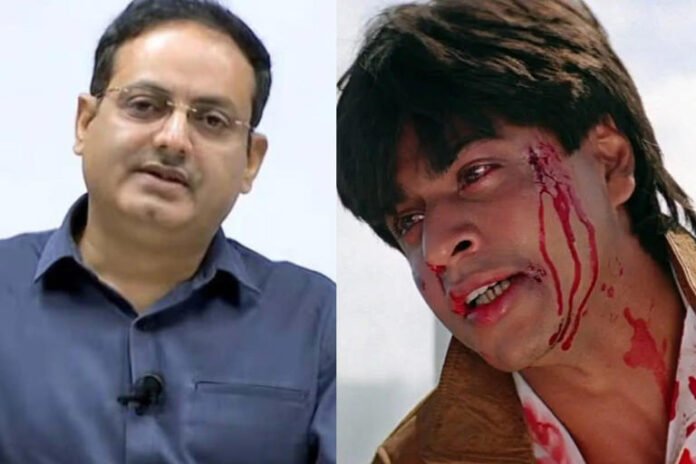In the vast pantheon of Bollywood films, few characters have left as lasting an impression as Shah Rukh Khan’s obsessive lover, Rahul, from the 1993 psychological thriller Darr. The film, directed by Yash Chopra, was a commercial hit, and SRK’s portrayal of an obsessive stalker cemented his reputation as an actor who could bring complex characters to life. However, in the years that followed, Rahul’s toxic and dangerous obsession with the female lead, Kiran (played by Juhi Chawla), has drawn its fair share of criticism. Recently, IAS officer and educator Dr. Vikas Divyakirti, known for his insightful views and fame from his portrayal in 12th Fail, added his voice to the criticism, questioning the glorification of such characters in Indian cinema.
Dr. Vikas Divyakirti’s Criticism: Yeh Lover Hai Ya Rapist Hai?
Dr. Vikas Divyakirti, a prominent figure in the field of civil services coaching and a widely respected intellectual, recently addressed the problematic portrayal of obsessive love in Darr. In a viral video, he posed a thought-provoking question: “Yeh lover hai ya rapist hai?” (Is he a lover or a rapist?), referring to Shah Rukh Khan’s character Rahul.
Dr. Divyakirti’s critique focused on how Bollywood, especially during the 1990s, romanticized dangerous behavior, including stalking, emotional manipulation, and non-consensual advances. In Darr, Rahul’s actions are invasive and terrifying, yet the film’s narrative often blurs the line between an obsessive lover and a sociopath, leaving audiences conflicted. Rahul’s pursuit of Kiran, culminating in violent confrontations, was presented with a veneer of romance. Dr. Divyakirti’s analysis highlights how such portrayals can have far-reaching consequences, shaping societal attitudes toward relationships and consent.
The Romanticization of Stalking in Bollywood
Bollywood has a long history of portraying obsessive love and stalking as acceptable or even desirable traits in a romantic hero. Films like Darr capitalized on this trope, with Shah Rukh Khan’s character expressing his love for Kiran through extreme, often terrifying, behavior. His infamous line, “I love you, K-K-Kiran,” became iconic, but the underlying message of such relentless pursuit was troubling.
Dr. Divyakirti pointed out that Rahul’s obsession, which escalates into violent actions, is not just a character flaw but a reflection of the larger cultural tolerance for stalking behavior in romantic narratives. He argued that such portrayals reinforce the idea that a woman’s ‘no’ is negotiable or that persistence in the face of rejection is an admirable trait. The character’s glorification, despite his dangerous actions, raises ethical questions about the kind of heroes Bollywood offers its audiences.
Influence of Darr on Popular Culture
When Darr was released, it was groundbreaking in its portrayal of a dark, obsessive anti-hero. Shah Rukh Khan, who was still rising in the industry, took a significant career risk by playing such a negative role. The gamble paid off, and he soon became synonymous with intense, unconventional characters. However, the film’s influence went beyond just box-office numbers and critical acclaim.
In the years that followed, Bollywood saw a slew of films featuring ‘anti-heroes’ who indulged in morally questionable behavior in the name of love. These characters were often redeemed by the film’s end or portrayed sympathetically, leaving audiences confused about the line between acceptable and unacceptable behavior in relationships.
Dr. Divyakirti’s critique is not just a comment on Darr alone but a broader indictment of a trend in Bollywood that normalizes problematic behavior. His pointed question—“Yeh lover hai ya rapist hai?”—is a call to reconsider how filmmakers and audiences define love and relationships in cinema.
The Evolving Narrative Around Consent in Indian Cinema
Dr. Divyakirti’s criticism comes at a time when conversations around consent, gender dynamics, and toxic masculinity are gaining momentum in India. Bollywood has seen a slow but noticeable shift in how relationships are portrayed, with films like Pink (2016) and Thappad (2020) addressing the importance of consent and mutual respect in relationships.
However, the impact of earlier films like Darr cannot be understated. Characters like Rahul, who blur the line between love and harassment, have left a lasting impression on the collective consciousness of Indian audiences. Dr. Divyakirti’s comments highlight the responsibility filmmakers have in shaping public perceptions, especially in a country where gender-based violence and harassment are pressing social issues.
Dr. Vikas Divyakirti’s critique of Shah Rukh Khan’s character in Darr is a timely reminder of the power of media to influence societal attitudes. By questioning the romanticization of obsessive behavior, Dr. Divyakirti brings attention to the need for more responsible portrayals of love and relationships in Indian cinema. His provocative question—“Yeh lover hai ya rapist hai?”—forces audiences to rethink the characters they idolize and the messages they internalize from popular culture. As Bollywood continues to evolve, it is essential to acknowledge and address the problematic aspects of its past to create a more responsible and respectful cinematic future.

